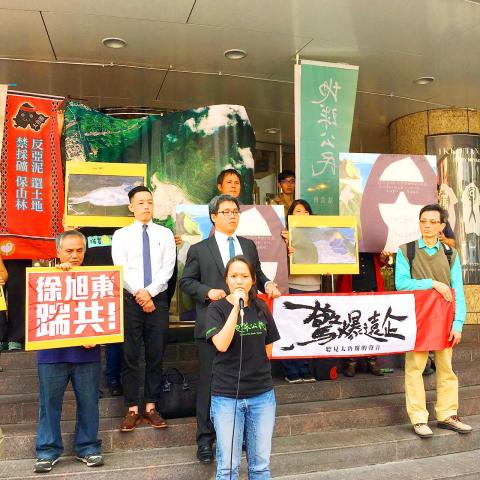Environmentalists and people living close to mining areas operated by Asia Cement Corp yesterday staged a flash mob event in front of the Far Eastern Plaza in Taipei to protest the Ministry of Economic Affairs’ “stealthy” extension of the corporation’s mining rights.
The extension would allow the company to continue marring the ecology and extend the ordeal Truku Aborigines face until 2037, protesters said.
The sound of explosions were played over loudspeakers, while smoke canisters were deployed to mimic a mining operation.

Photo: Yang Mien-chieh, Taipei Times
Police were at the scene to maintain order.
Asia Cement is a subsidiary of Far Eastern Group, which runs the Far Eastern Plaza.
“Taiwan is a democracy, but the Mining Act (礦業法) makes the nation look like a colony,” Citizen of the Earth, Taiwan member Pan Cheng-cheng (潘正正) said.
Environmentalists have sought for the act to be amended and have gained the backing of legislators across party lines, Pan said, adding that Democratic Progressive Party (DPP) Legislator Gao Jyh-peng (高志鵬), who chairs the legislature’s Economic Committee, this month said that the act is to be reviewed during this legislative session.
However, the ministry on the same day that Gao made the announcement extended Asia Cement’s mining rights in Hualien County’s Sincheng Township (新城) for 20 years, allowing the company to bypass an environmental impact assessment, she said.
Pan accused the ministry of safeguarding the company’s interests ahead of the proposed amendment.
The company has operated at the site for 60 years, despite it being a geologically sensitive zone that is prone to landslides, Pan said.
Cheng Wen-chuan (鄭文泉), a Truku whose home is near the mining site, said that vibrations from mining activity has caused his walls to crack and he has had to put up with thick dust.
Brandishing the deed to his property and a farming permit, Cheng said he had been unable to grow crops because his land had been cordoned off by Asia Cement workers.
Cheng urged the ministry to revoke its decision, saying he is disappointed at the swift approval of the company’s request for extended mining rights.
Article 21 of the Indigenous Peoples Basic Law (原住民基本法) stipulates that the government should consult Aborigines and gain their consent before carrying out developments in Aboriginal territory, but the ministry’s decision shows that it “treats the act like trash,” Cheng said.
President Tsai Ing-wen (蔡英文) in August last year after meeting with Tien Chun-chou (田春綢), who lives on land used by Asia Cement, instructed the Council of Indigenous Peoples to enforce the act when dealing with the firm’s application for an extension of its mining rights, Wild at Heart Legal Defense Association lawyer Hsieh Meng-yu (謝孟羽) said.
However, ministers without portfolio Lin Wan-yi (林萬億) and Chang Ching-sen (張景森) disobeyed Tsai’s order following negotiations, allowing the ministry to grant the company the extension, Hsieh said.
He urged people to call the Executive Yuan and the legislature to press agencies to abolish the “illegal” permission given to Asia Cement to continue mining.

Taiwan has received more than US$70 million in royalties as of the end of last year from developing the F-16V jet as countries worldwide purchase or upgrade to this popular model, government and military officials said on Saturday. Taiwan funded the development of the F-16V jet and ended up the sole investor as other countries withdrew from the program. Now the F-16V is increasingly popular and countries must pay Taiwan a percentage in royalties when they purchase new F-16V aircraft or upgrade older F-16 models. The next five years are expected to be the peak for these royalties, with Taiwan potentially earning

STAY IN YOUR LANE: As the US and Israel attack Iran, the ministry has warned China not to overstep by including Taiwanese citizens in its evacuation orders The Ministry of Foreign Affairs (MOFA) yesterday rebuked a statement by China’s embassy in Israel that it would evacuate Taiwanese holders of Chinese travel documents from Israel amid the latter’s escalating conflict with Iran. Tensions have risen across the Middle East in the wake of US and Israeli airstrikes on Iran beginning Saturday. China subsequently issued an evacuation notice for its citizens. In a news release, the Chinese embassy in Israel said holders of “Taiwan compatriot permits (台胞證)” issued to Taiwanese nationals by Chinese authorities for travel to China — could register for evacuation to Egypt. In Taipei, the ministry yesterday said Taiwan

Taiwan is awaiting official notification from the US regarding the status of the Agreement on Reciprocal Trade (ART) after the US Supreme Court ruled US President Donald Trump's global tariffs unconstitutional. Speaking to reporters before a legislative hearing today, Premier Cho Jung-tai (卓榮泰) said that Taiwan's negotiation team remains focused on ensuring that the bilateral trade deal remains intact despite the legal challenge to Trump's tariff policy. "The US has pledged to notify its trade partners once the subsequent administrative and legal processes are finalized, and that certainly includes Taiwan," Cho said when asked about opposition parties’ doubts that the ART was

If China chose to invade Taiwan tomorrow, it would only have to sever three undersea fiber-optic cable clusters to cause a data blackout, Jason Hsu (許毓仁), a senior fellow at the Hudson Institute and former Chinese Nationalist Party (KMT) legislator, told a US security panel yesterday. In a Taiwan contingency, cable disruption would be one of the earliest preinvasion actions and the signal that escalation had begun, he said, adding that Taiwan’s current cable repair capabilities are insufficient. The US-China Economic and Security Review Commission (USCC) yesterday held a hearing on US-China Competition Under the Sea, with Hsu speaking on